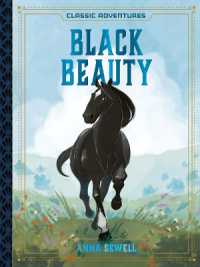- ホーム
- > 洋書
- > 英文書
- > Literary Criticism
Full Description
Exemplifying a new methodology identified as'animality studies' that focuses on constructions of animality at specific historical and cultural moments, without the explicit emphasis on animal advocacy that is often found in animal studies, this book explores animality at the turn of the twentieth century in the United States. At that moment, shifts in what it meant to be both 'human' and 'animal' became crucial in terms of producing new ways of thinking about a wide range of human behaviors, including homosexuality, labor exploitation, and the lynching of black men. The discourse of 'the jungle' was born at the confluence of Darwin and Freud, once human behavior could be explained, supposedly, by animal instincts that were naturally violent in the name of survival and heterosexual in the name of reproduction. Literary and cultural texts at the turn of the twentieth century produced new ways of thinking about the 'beast within' shifting away from a Protestant Christian formulation of a devilish inner beast that was sinful and violent. But the central argument here is that Darwinist-Freudian formulations of the human animal, despite reigning critical interpretations, were often contested rather than reinforced by writers such as Jack London, Henry James, Frank Norris, Upton Sinclair, Edgar Rice Burroughs, and William James, as well as cultural events such as a circus elephant publicly electrocuted at Coney Island, an African man on display in the Monkey House of the Bronx Zoo, and the Scopes "Monkey Trial." Ultimately, this book reveals not only new ways of thinking about familiar texts, but also the significance of the question of the animal in relation to fields such as the history of sexuality, studies of literary naturalism, and critical race studies within American literary and cultural studies. The book reveals how the figure of the animal evolved in U.S. literature and culture at the turn of the century, particularly through the birth of the jungle: a discourse that continues to enable enduring justifications of homophobia, economic exploitation, and racism in the United States and beyond.
Contents
Introduction ; The Nature of the Beast in U.S. Culture ; Part I: Epistemology of the Jungle ; 1. Progressive-Era Sexuality and the Nature of the Beast in Henry James ; 2. Between Species: Queering the Wolf in Jack London ; Part II: Survival of the Fittest Market ; 3. The Octopus and the Corporation: ; Monstrous Animality in Norris, Spencer, and Carnegie ; 4. The Working-Class Beast: Frank Norris and Upton Sinclair ; Part III: The Evolution of Race ; 5. Archaeology of a Humane Society: Animality, Savagery, Blackness ; 6. Black Savage, White Animal: Tarzan's American Jungle ; Epilogue ; Animal Legacies: William Jennings Bryan and the Scopes " ; Works Cited ; Index







